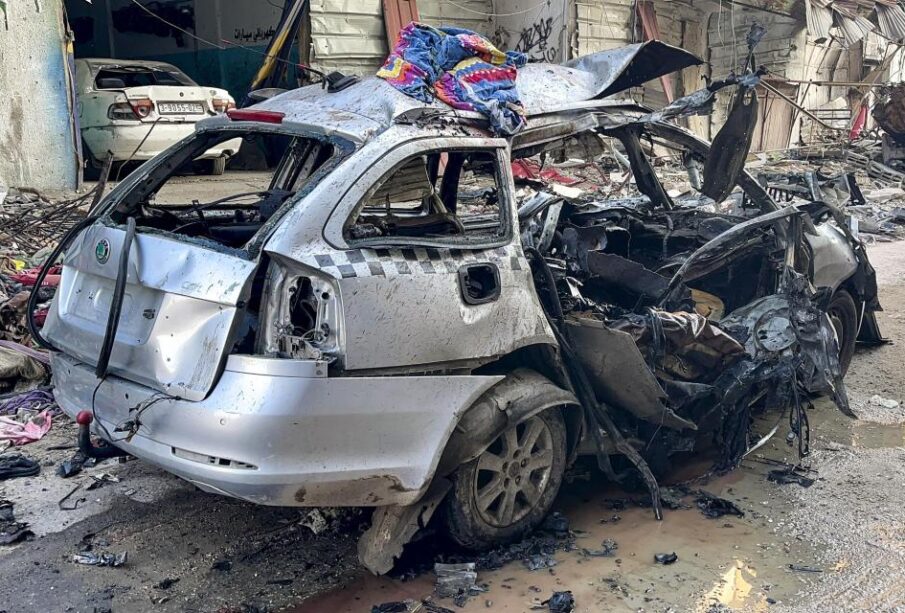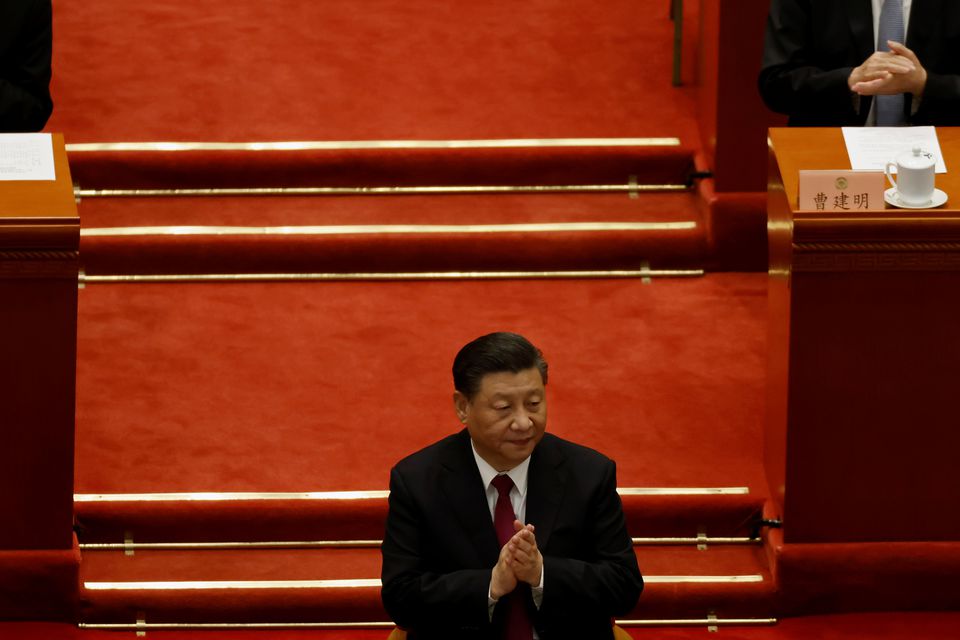Israeli strike kills Hamas leader Ismail Haniyeh’s sons in Gaza as truce talks drag on
 The car in which three sons of Hamas leader Ismail Haniyeh were reportedly killed in an Israeli air strike is pictured in al-Shati camp, west of Gaza City. AFP via Getty Images
The car in which three sons of Hamas leader Ismail Haniyeh were reportedly killed in an Israeli air strike is pictured in al-Shati camp, west of Gaza City. AFP via Getty ImagesBy Belal AlSabbagh with Fiachra Gibbons in Jerusalem AFP
An Israeli strike Wednesday killed three of Hamas chief Ismail Haniyeh’s sons in Gaza, the Palestinian leader and Israel’s military said, as war rages in the Palestinian territory despite ongoing truce negotiations.
Hamas said in a statement that three of Haniyeh’s sons and four of his grandchildren were killed in the air strike.
Israel confirmed the killings, saying the sons were “Hamas operatives” who were “on their way to carry out terrorist activities”.
The strike came as talks in Cairo aimed at a ceasefire and a hostage release deal dragged on without signs of a breakthrough.
Speaking to Al Jazeera, Haniyeh, who is based in Qatar, suggested the strike was an attempt to shift Hamas’s negotiating stance, but insisted it would not work.
US President Joe Biden meanwhile said Hamas “needs to move” on the latest truce proposal, which the militant group has said it was considering.
The United States has also been ramping up pressure on Israel to agree to a truce, increase the amount of aid it allows into the besieged Gaza Strip and abandon plans to invade the southern city of Rafah.
Biden labelled Israel’s conduct of the war a “mistake” in an interview broadcast on Tuesday, before warning on Wednesday that it was not allowing enough aid into the territory.
As Israeli forces kept up combat operations and air strikes across the Gaza Strip, Muslims gathered to pray amid the devastation of the six-month war, to mark the first day of Eid al-Fitr which ends the fasting month of Ramadan.
The war broke out with Hamas’s October 7 attack against Israel, which resulted in the deaths of 1,170 people, mostly civilians, according to Israeli figures.
Palestinian militants also took about 250 hostages, 129 of whom remain in Gaza, including 34 the Israeli army says are dead.
Israel’s retaliatory offensive has killed at least 33,482 people in Gaza, mostly women and children, according to the Hamas-run territory’s health ministry.
– ‘Disproportionate response’ –
Israeli war cabinet member Benny Gantz said that militarily “Hamas is defeated” but insisted that Israeli troops would nevertheless enter Rafah and return to Khan Yunis, from which they withdrew several days ago.
The army would have to fight for years to come, “in the Gaza Strip and in the West Bank and in the Lebanon front”, he added.
More than 1.5 million civilians are sheltering from the war in Rafah, the last Gazan city yet to face an Israeli ground invasion.
Israel’s close ally the United States has repeatedly warned against an invasion.
Biden, voicing his growing frustration with the hawkish Netanyahu, issued some of his sternest criticism yet of the war.
“I think what he’s doing is a mistake,” Biden told the US network Univision in an interview that aired on Tuesday night having been recorded last week.
He urged Netanyahu to “just call for a ceasefire, allow for the next six, eight weeks, total access to all food and medicine going into” Gaza.
Talks mediated by the United States, Egypt and Qatar have been ongoing since Sunday, with Hamas still considering the latest proposal.
Hamas spokesman in Doha Hossam Badran told AFP: “Hamas is studying the offer presented… It has not responded yet.”
A framework being circulated would halt fighting for six weeks and see the exchange of about 40 hostages for hundreds of Palestinian prisoners.
Biden, speaking at a news conference on Wednesday, said “It’s now up to Hamas, they need to move on the proposal that’s been made”.
Reacting to the strike that killed his sons and grandchildren, Haniyeh told Al Jazeera, “if they (Israel) think that targeting my children… at the peak of these talks and before the movement’s response, if they think that this will force Hamas to change its positions, they are delusional”.
Beyond Washington, there has been a growing chorus of international criticism aimed at Israel’s conduct of the war and the paucity of aid entering the territory.
On Wednesday, Spanish Prime Minister Pedro Sanchez warned that what he called Israel’s “disproportionate response” in Gaza risked “destabilising the Middle East, and as a consequence, the entire world”.
Spain is among several Western nations, including Ireland and Australia, to have suggested they would recognise a Palestinian state in the near future as a starting point for wider peace talks.
– ‘Sea change’ in aid supply –
In central Gaza — the only area where Israeli ground troops are actively deployed — a strike on a home in the Nuseirat camp killed 14 people, the health ministry said.
The Israeli military said on Wednesday that “Israeli troops are continuing to operate in the central Gaza Strip and killed a number of terrorists over the past day”.
The military added that aircraft had “struck dozens of terror targets in the Gaza Strip, including military sites, launchers, tunnel shafts and infrastructure”.
Washington’s tougher line on aid has brought some results, the US Agency for International Development said.
Recent days had seen a “sea change” in aid deliveries, said USAID administrator Samantha Power, although she insisted Israel needed to do more.
On Wednesday Israeli Defence Minister Yoav Gallant said Israel would “flood Gaza with aid”, using a new crossing point on its northern border, streamlined checks and two new routes organised with Jordan.
He said they expected to hit 500 aid trucks entering Gaza a day, which would match the average level of aid and commercial trucks reaching the territory before the war.
Regional tensions have surged amid the conflict.
Iran’s supreme leader Ayatollah Ali Khamenei warned Israel that it “must be punished and will be punished” for a strike on the Iranian consulate in Damascus last week that Tehran has blamed on Israel.
Israeli Foreign Minister Israel Katz replied with a Persian-language post saying “if Iran attacks from its territory, Israel will respond and attack Iran”.











